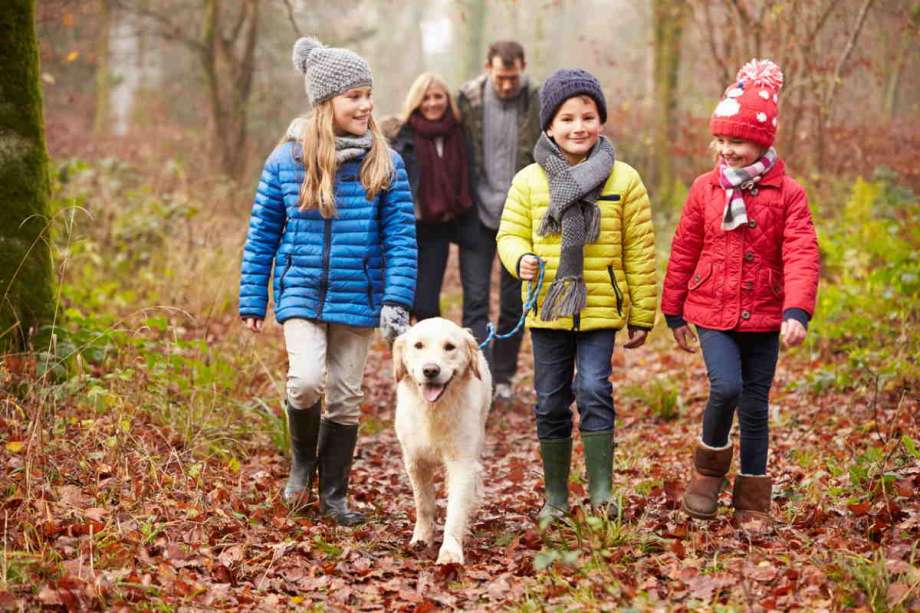4 Benefits of Owning a Dog For Families

Naysayers will argue that dogs are smelly, messy, and time-consuming—but wait until you hear about the great and unique ways that owning a dog can benefit you!
If you’re interested in adopting a dog but some family members are still on the fence about Fido, just share this article with them to sway them to your side. After learning about these four benefits your whole family can get from having a dog, it will be impossible not to be convinced to get to the shelter or breeder immediately.
More: How Your Genes Can Influence Whether You’ll Be A Dog Person
Even if you already own a dog, this article will illuminate the specific ways that they are helping you have a better life.
1. Dogs Can Offer Protection
Dogs are known to form especially strong bonds with children, which is great news for any parent concerned about their child’s safety.
Having the companionship of a dog can help protect kids against bullies and fights. It may also help keep your peace of mind to know that you have someone guarding the house at night and when you are away during the day.
If you are specifically interested in a guard dog, German shepherds, rottweilers, and Doberman pinschers are all great family dogs that have strong protective and loyal instincts.
A well-trained guard dog will respond to intruders but will not be aggressive or vicious in their daily lives. They will be fiercely loyal to their pack (your immediate family), will be gentle with your children, and ready to defend them in case of danger.
2. Everyone Gets Physically Healthier...
Walking a dog has measurable and proven health benefits for you—it strengthens bones, joints and muscles, increases cardiovascular fitness, burns fat, reduces blood pressure, and reduces stress.
With children, these benefits are even more pronounced. Kids who spend time walking their dog and playing outside are more likely to meet activity recommendations, which means they are at a lower risk for obesity and cardiovascular disease.
Spending more time outside correlates to less time spent in front of screens. Studies have shown that prolonged use of digital devices such as phones, computers, tables, and televisions increases exposure to harmful blue light, strains eyes, and can cause headaches.
While a dog is not meant to and cannot replace your devices, it can help your whole family reduce screen time and spend more time outside, which are health benefits that any parents would want.
When choosing what breed you’re going to get, you should consider your family’s current activity level. Do you spend your weekends going for hikes or on the couch? If you are less active, consider getting a breed that will help you get outside, but does not require exercise that is unrealistic for your lifestyle, such as a pug or basset hound. Check out All Things Dogs’ list of 22 Best Family Dogs to help you find the best fit for your household.
3. …and Healthier Mentally
Physical activity is intrinsically tied to mental health—regular exercise (such as that you get from walking and playing with a dog) helps reduce stress and improve sleep. So does spending time in nature, where you are more likely to be than your non-dog owning counterparts. (Check out How Pets Can Impact Kids' Mental Health.)
The companionship of a dog can help with feelings of loneliness in people of all ages. Dogs can bring comfort to people with a range of mental illnesses, including anxiety, depression, PTSD, attention deficit disorder, and chronic stress—it is easy to see why so many emotional support animals are canines.
When you cuddle with a dog, it stimulates the release of the hormone oxytocin in the brain, which soothes feelings of anxiety and creates a more positive emotional state.
Especially in stressful times such as those 2020 has presented, a dog can be a powerful stress-reliever for adults and children alike.
4. Dogs Are Good for Kids’ Development
Having a family dog can help children develop socially and intellectually at faster rates than their pet-less peers. Taking care of a dog can:
- Teach responsibility: Involving your child in the care of the dog will help them become more responsible. Assign a task such as walking, putting away toys, or feeding breakfast or dinner. If you have a larger family, rotate the duties throughout the week. These tasks are more than chores—they are essential parts of caring for another living thing that are rewarding and confidence-building.
- Increase self-esteem: Taking part in the care of the dog in age-appropriate ways will give your children a sense of accomplishment and help them become more independent. Even children as young as toddlers can be taught to place a bowl of food on the floor or to gently pet a dog. If your children are old enough, letting them take the dog outside by themselves is a great way to help them safely increase their independence. The unconditional love a dog gives can help your children become more confident and loving of themselves and other.
- Increase social skills and communication skills: Studies have proven that animals, including dogs, can help children with autism become more interactive, social, and less anxious. Because children tend to talk to animals, having a dog can aid in language acquisition and help improve communication skills in children of all ages. As empathetic creatures themselves, dogs can help children become more compassionate, understanding, and caring of animals and other humans.
If you have been on the fence about getting a family dog, hopefully this article has convinced you that welcoming a furry friend into your home as a new family member is one of the most rewarding things you can do!
They can offer protection, help you be physically and mentally healthier, and help with children’s cognitive and social development — what’s not to love about that?
Considering a dog? Check out The Best Dogs for Kids and Families.